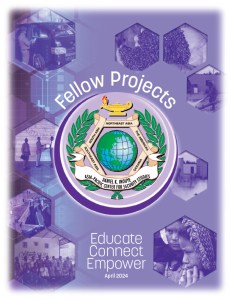Fellow Project is an integral part of DKI APCSS’s long courses. It requires participants to undertake a project demonstrating their expertise by applying their acquired knowledge and skills. This process includes:
- Collaboration and Networking: Fellows work together and engage with faculty and experts, fostering relationships and mutual understanding.
- Perspective Sharing: Discussing local, national, and regional security challenges enhances networks and deepens understanding of a rules-based order and a free and open Indo-Pacific region.
- Research and Analysis: Fellows leverage their experience to research a specific topic, increasing situational awareness, creating viable options, and forming practical recommendations through critical thinking.
- Expand capacity for critical thinking
- Practice querying, dialogue, cooperation, and connecting with key stakeholders
- Hone inquiry skills for future work
- Produce outcomes of real-world value

Read the latest fellow’s project booklet to celebrate their achievements and discover how their work fosters a secure and prosperous region.
- Individual Fellow Project: Each fellow undertakes a project focusing on a specific challenge related to a policy, program, process, or practice. This project is completed independently, allowing the fellow to apply their unique insights and expertise.
- Cohort Project (Group Project): In this format, fellows collaborate on a group project. To participate in a Cohort Project, each fellow must be preselected by their respective country’s embassy and DKI APCSS. This collaborative approach encourages teamwork and leverages the diverse perspectives of the fellows involved.
* If your country wishes to send a team to work on a Cohort Project, inform the US Embassy, the DKI APCSS Recruiter (recruiter@apcss.org), and the Fellow Project Team (fellowsproject@dkiapcss.net).
Fellow Project Highlight
Project Phases
| Fellows Project | Cohort Projects | |
|---|---|---|
| Before Course |
|
|
| During Course |
|
|
| After Course |
|
|
Latest News and Guest Speakers
Senior Leaders Gain a New View of the Region at TSC 23-2
The Daniel K. Inouye Asia-Pacific Center for Security Studies recently graduated 27 Fellows from the Transnational Security Course (TSC) 23-2, closing out the Center’s slate of course offerings for the 2023 calendar year. From [...]
CSC 23-3: Fellows navigate uncertainty with courage
In a world marked by evolving geopolitical security challenges, the Daniel K. Inouye Asia-Pacific Center for Security Studies (DKI APCSS) hosted the Comprehensive Security Cooperation (CSC) course 23-3 in Honolulu, bringing together 108 Fellows [...]
Experts from Europe and Indo-Pacific Collaborate to Strengthen Whole-of-Society Resilience
In collaboration with the George C. Marshall European Center for Security Studies (GCMC), the Daniel K. Inouye Asia Pacific Center for Security Studies (DKI APCSS) held the Building Whole of Society Resilience workshop on [...]
Standout Fellows Return to the Center as ‘Alumni Seminar Leaders’
Two standout alumni, Purnima Malik “PM” (CSC 22-1) from India and Oliver Nobetau “Ollie” (CSC 22-2) from Papua New Guinea, served as Alumni Seminar Leaders for the Comprehensive Security Cooperation (CSC) 23-1. According to [...]
Balancing Economic Security: Insights from Alumnus Col. Mendee Jargalsaikhan
Alumnus Col. Mendee Jargalsaikhan is the Deputy Director for Mongolia's Institute for Strategic Studies of the National Security Council. He is a graduate of the Comprehensive Security Cooperation 23-1 course and the Executive Course 01-2.
Mr. Krishna Bahadur Raut Receives the 2021 ‘Alumni of the Year’ award
DKI APCSS recognized Raut’s contributions as an alumnus who significantly improved the peace and security within his country of Nepal and in the Indo-Pacific Region. Raut’s Fellows Project resulted in seven new provincial emergency operation centers. He drafted eight of the fifteen laws required to support the expansion of the EOCs. He also played an instrumental role in passing significant policies that included the Disaster Management Act, Risk Reduction Policy, and the National Strategic Action Plan.





























